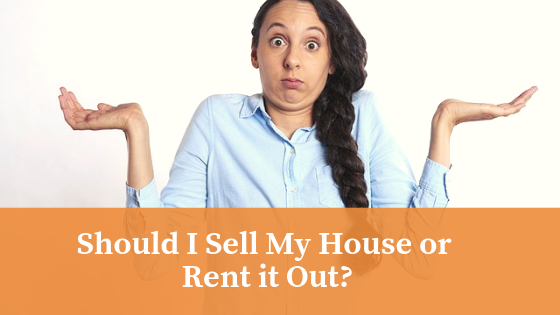When the time comes to move from your current house, you’ll ask yourself, “Should I sell my house or rent it out?“. Whether you’re downsizing, upgrading, or moving for any reason, it’s a big decision. Here’s an outline of what your considerations might be.
If you’ve never wanted to be a landlord and hate the idea of other people in your property, you might want to just sell. Before we get too deep into this topic, the easy way out is to sell and move on with your life.
I’ll assume you’re torn about the decision. You see some pros and cons for each option and aren’t sure what to do. Let’s get started answering the question “Should I sell or rent my house”.
Pros and Cons for Selling and Renting Out your House
Pros for Selling your house:
- Selling your house is the easiest option – You sell, and are done.
- You can do whatever you want with the profit (assuming there is profit)
- You can re-invest in other assets, including your down payment on your next house, which will lower your monthly costs.
- Or you can splurge and buy yourself a boat or something irresponsible.
- Tax Benefits – profit on the sale of your primary residence is not taxable up to $250,000 or $500,000 for a married couple. That’s huge!
- You avoid an uncertain future: Who knows what will happen to the market or economy. If you sell your house now, you avoid trying to sell your house later during zombie apocalypse, when your house would not be worth much.

Pros for Renting your house:
- The major reason why renting out your house is attractive is that owning real estate builds wealth in at least 4 ways:
- Cash Flow: If you spend $1500 a month to own your house, but you can rent it out for $2000, you’re cash flowing $500 monthly. It’s like giving yourself a raise!
- Loan Pay Down: In this example, if you rent your house out for 1500, you’re breaking even, right? Actually each payment chips away at your loan principal, so over time, you owe less, thereby growing your equity and your wealth. After 30 years, your tenants bought you a house!
- Tax Benefits – As a landlord, you can write off certain expenses related to your business, including depreciation, and others.
- Appreciation: If the value of your house increases over time, you can sell years down the road and get that money in your pocket.
- You can come back and change your mind
Cons for Selling your house:
- You miss out on future price increases and landlord wealth building
In the long term, prices are expected to increase. If you sell now, you leave that potential profit on the table. On the other hand, if you pull this money out, make sure you know what you’ll do with it and ensure it’s a better investment than owning the house. It might be better to keep your house if you just like the idea of having a bunch of cash in the bank.
- It’s easier than landlording, but it takes some work and investment
Being a landlord takes time, work, and continued investment. So it’s true that selling your house is easier, but it’s not easy. There are always repairs and updates to do, along with staging, and photos just to get the house on the market. Once it’s listed, you’ll have to coordinate showings, open houses, and negotiate offers before you are done with a sale. As realtors, we earn our money by making this transaction as easy as possible, but it’s work.
- Don’t forget to estimate costs to sell in calculation
So as described above, along with all that work and stress, there are also costs associated with selling a house. Repairs, updates, taxes, and realtor fees are among the costs that must be taken into account before deciding to sell. Just because you have $100,000 in equity, doesn’t mean you can expect to walk away with $100,000 cash.
Cons for Renting your house
- Landlording can be a job and a difficult one at that

Being a landlord isn’t just idly hanging out with the monopoly guy and Mr. Burns while you wait to collect your rents each month. In fact, there’s work to be done. You have to be responsive to your tenants and make repairs quickly along with treating them fairly and in accordance the law. There’s also record keeping related to taxes and expenses.
- Legal Liabilities:
You still own the house, so if something goes wrong, you’re responsible. Let’s say a delivery person slips and falls on your front door step. They’re not suing the tenant, they’re suing YOU. Anything can go wrong, and although insurance is there to protect you, insurance agreements are long to protect the insurance company.
- Profits are taxable when you sell as an investor
As discussed previously, when you live in a house, you can make profit and it’s not taxed, within certain limitations. As an investor, your profit is taxed and it hurts! A few percentage points in a tax rate can mean tens of thousands of dollars out of your pocket! (Note: you can avoid or defer these taxes with programs like the 1031 exchange and Opportunity Zones which I’ll write about soon)
- Your money is tied up in the house
As long as you have tens of thousands of dollars tied up in a house, it’s not being used on other opportunities. From the perspective of an investor, that’s a problem. One solution that might work if conditions are right is to refinance your loan and pull money out of it.
In Conclusion – What should should I do? Should I sell or rent my house?

Before taking the leap, spend some time and analyze the next house purchase and your position to buy it. I won’t go into this topic much because it’s covered in depth here. In summary, you’ll ask yourself how much can you afford, and how much liquid cash you have for a down payment? Finally, does this budget match your needs and wants (the reasons you’re moving)?
Then, work your way through the pros and cons listed in this article. You’ll have a better idea about which way you’re leaning. Of course, call or text us for a no-pressure, honest discussion and a recommendation.

